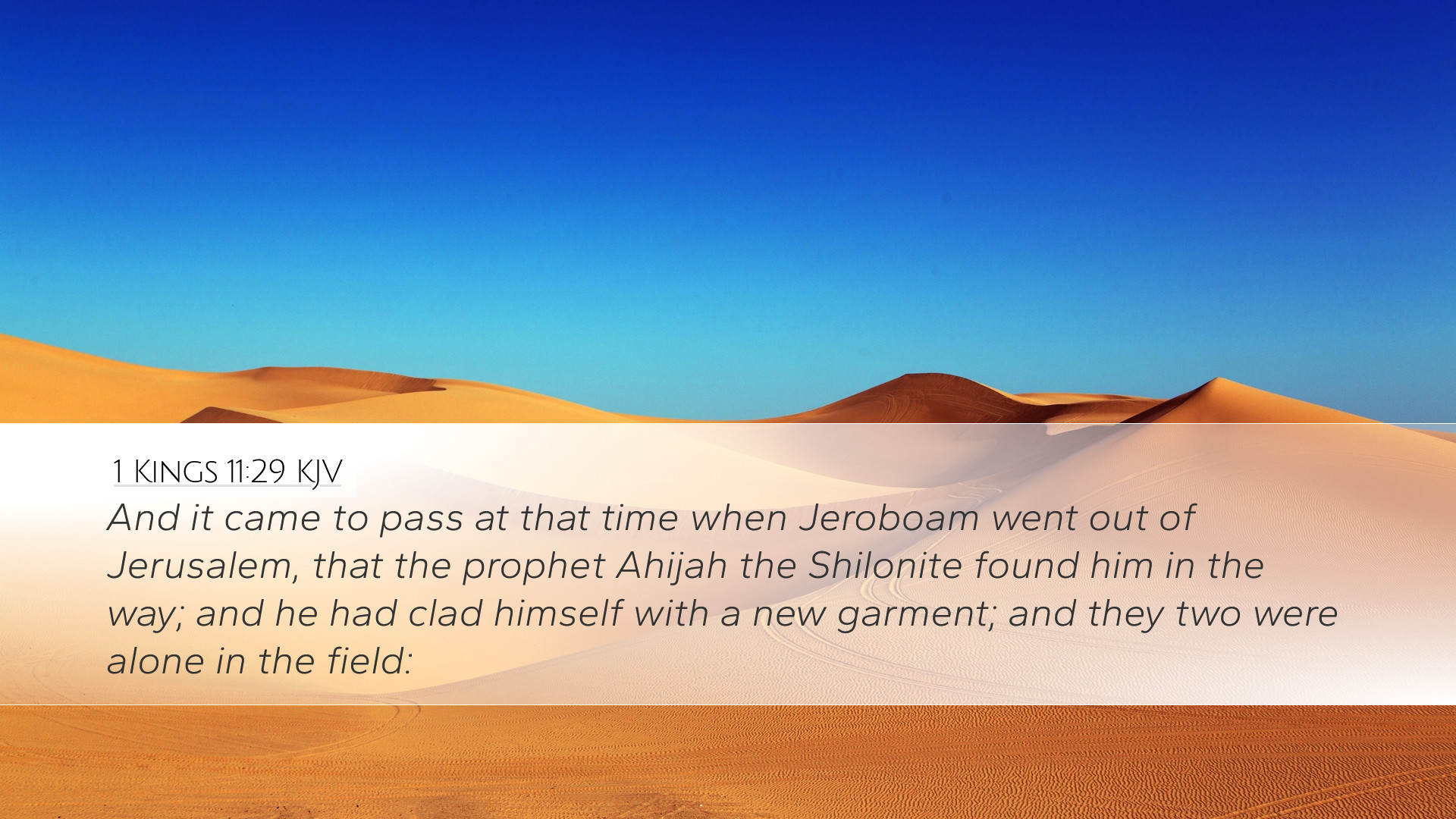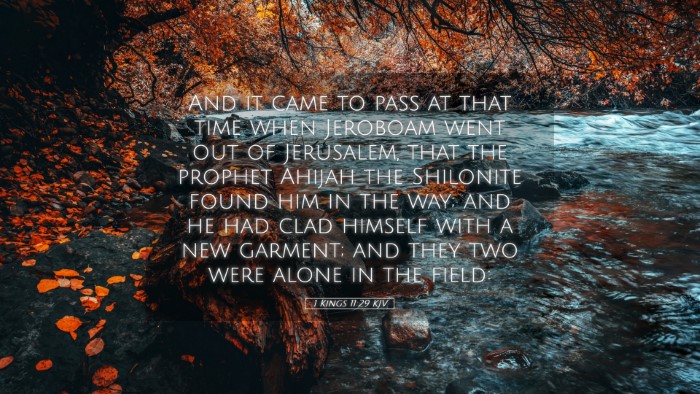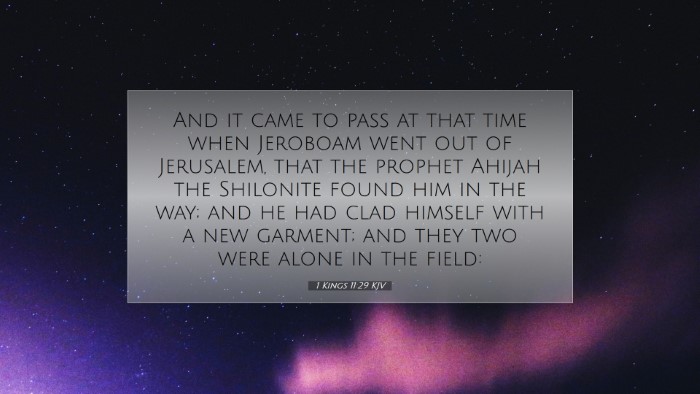Bible Commentary on 1 Kings 11:29
This passage marks a significant transition in Israel's history, introducing the pivotal character of Jeroboam and the prophetic word that shapes the future of the nation. The setting takes place shortly after Solomon's reign began to wane due to idolatry and divided loyalty. The commentaries of Matthew Henry, Albert Barnes, and Adam Clarke provide important theological insights pertinent for pastors, students, theologians, and biblical scholars.
Textual Analysis
1 Kings 11:29 states:
"And it came to pass at that time when Jeroboam went out of Jerusalem, that the prophet Ahijah the Shilonite found him in the way; and he had clad himself with a new garment; and they two were alone in the field."
This verse signals a moment of divine intervention and prophetic revelation. Jeroboam, a former servant of Solomon, is on a journey that would alter the course of Israelite history.
Contextual Importance
This scripture invites readers to consider the eventual division of the kingdom of Israel, a consequence of Solomon's actions and God's judgment. Theological discourse around this verse emphasizes the sovereignty of God in directing his plans through human actions.
Matthew Henry's Perspective
Matthew Henry highlights the significance of prophecy in guiding and warning individuals in the unfolding of God's plans. He draws attention to the symbolism of Jeroboam’s new garment, suggesting it represents a new calling or role being conferred upon him.
- New Garment Symbolism: The new garment signifies a change, as God prepares Jeroboam for leadership. This notion aligns with the biblical theme of God calling individuals out of their previous lives to fulfill a new destiny.
- The Role of Prophecy: Henry emphasizes the prophetic act of Ahijah as an essential means of communication between God and man, framing Jeroboam’s upcoming actions within the context of divine intent.
Albert Barnes' Insights
Albert Barnes offers a practical examination of the text, focusing on the consequences of spiritual disobedience that Solomon exhibited. He links Jeroboam's rise to the Lord's judgment against Solomon, illustrating how God orchestrates events to fulfill His will, even through flawed leaders.
- Divine Judgment: Barnes argues that Jeroboam's ascension is intricately tied to the apostasy of Solomon, indicating God’s displeasure with kingship that strays from faithfulness to Him.
- Jeroboam's Character: He delineates Jeroboam as a complex figure whose potential for greatness is undermined by the very rebellion that he would soon embody, showcasing God's mercy intertwined with human fallibility.
Adam Clarke's Commentary
Adam Clarke offers an expansive view on the practical implications derived from Jeroboam's encounter with Ahijah. He mentions the geographical and cultural significance of Shiloh, a place of divine revelation and mishkan (tabernacle) presence.
- Shiloh's Significance: Clarke describes Shiloh as a historical site of covenant presence, emphasizing the importance of location in understanding God's communication with His people.
- Communion with God: His insights encourage a reflection on how God often calls individuals away from comfort zones (i.e., Jerusalem) to engage with their calling in isolation or wilderness, highlighting the process of preparation for leadership.
Theological Reflections
The convergence of these commentaries presents a multifaceted view of Jeroboam's story. Understanding the nature of God's call through prophecy allows deeper contemplation on leadership, obedience, and accountability in spiritual affairs.
- Leadership and Divine Purpose: This passage extrapolates themes of leadership; Jeroboam's destiny reflects the overarching narrative of God choosing leaders based on God's criteria rather than human standards.
- The Sovereignty of God: It is crucial to recognize that God remains sovereign, orchestrating circumstances for His purposes. The unfolding narrative reminds believers that even in apparent chaos, God’s plan prevails.
Practical Application
For contemporary readers, this passage invites rigorous self-examination regarding leadership and faithfulness to God's commandments. It also emphasizes the necessity for spiritual leaders to remain vigilant against the idolatry that led to Israel's division.
- Faithfulness in Leadership: As leaders, it is incumbent upon us to be watchful and responsive to God's direction, recognizing that prosperity and influence come with responsibility.
- The Role of Prophecy Today: The lessons of divine guidance in decision-making should inspire believers to seek God earnestly in their pursuits and to listen for His counsel through Scripture and prayer.
Conclusion
1 Kings 11:29 serves as a critical juncture in the biblical narrative, filled with prophetic significance and the dramatic turning of the tide in Israel's history. Insights from Matthew Henry, Albert Barnes, and Adam Clarke shed light on the complexities and implications of divine sovereignty, human leadership, and the profound impact of spiritual fidelity.
As we reflect on these insights, may they guide us in our own spiritual journeys, pushing us toward greater obedience, discerning hearts, and leadership that honors God.


